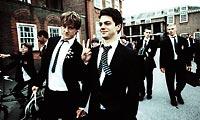The art (and philosophy) of filming "History Boys"

Interview: Nicholas Hytner, director
In its whirlwind 2006 journey from celebrated London hit to Broadway success, the Alan Bennett play "The History Boys" took a summer detour.
In summer 2005, that's when the esteemed tragicomedy — about a crew of smart-as-whips male students vying for coveted spots at the elite Cambridge and Oxford universities — was filmed by Nicholas Hytner, the same respected British director who guided the work onstage.
The movie retains most of the cast from the original Broadway production, which won six Tonys. Two Tonys were for the play and Hytner's production; others went to Richard Griffiths as a dedicated teacher (and closeted homosexual), and Frances de la Tour as his sympathetic colleague. (The set design and lighting also earned Tonys.)
The film also boasts a small gang of gifted young British actors (i.e., Dominic Cooper, Samuel Anderson) you many not know — yet. And if Bennett's prolix, witty script (honored with both a Tony Award and a British-equivalent Olivier prize) has been "opened up" a bit for the film, it certainly isn't dumbed-down.
Hytner (who earlier directed the stage and screen versions of Bennett's "The Madness of King George") chatted by phone recently about the play, the movie and his current tenure as artistic director of London's National Theatre, where "History Boys" originated.
Q: The film of "History Boys" seems remarkably faithful to the play. Did you cut much text?
A: There are no significant cuts. It's a very talky film that we knew would attract a niche audience, one that's literate and can appreciate dialogue that conveys the rich, unique imagination of this playwright.
Q: Few American popular dramas look at educational philosophy, the meaning of modern history, et al. Are you surprised "History Boys" was so well-received here?
A: You never expect success, certainly not on the scale this play has had. But it doesn't surprise me that Americans like it. I think many people sell the U.S. audience short. I'm always struck by how many people you find in bookstores here.
There's an American audience that wants to be transported to specific, unfamiliar worlds and cultures ... when they're transformed by an artist's imagination.
Q: The talented actors playing the public-school kids are such a tight ensemble. How did you encourage that?
A: They're exceptional actors individually. We were fortunate they all got on so well, and began to run as a pack. As it happens, none are university graduates. So we gave them a quick gallop through history and literature, a sort of "Oxbridge" boot camp.
Q: What is your own educational background?
A: In nearly 30 years, no one has had cause to ask me! As it happened, I majored in English at Cambridge. So nothing Alan, who went to both Cambridge and Oxford, was writing about was foreign to me.
Q: Did you have to take a standardized test, like these kids, to determine if you went to a university or trade school?
A: Yes, it was brutal. First you took an exam at age 11. If you did well there, you went on to what we call a grammar [academic] school. But you could be a failure at 11. The system enabled some ordinary kids like me to get a first-rate education. I went to Manchester Grammar, a school much like the one in "History Boys."
Q: The play is set in the 1980s, long after Bennett was a schoolboy. Why?
A: The last time you could teach like Hector [the Richard Griffiths character] was in the 1980s. There's a conflict in the story about educational values. Should education be utilitarian, target-driven? Or a romantic idea that expands the mind and soothes the soul? The debate is still raging, in England and obviously in America too.
Q: Do you see Hector, who is stubbornly romantic in his teaching style, as a hero?
A: Hector believes culture should be addressed from the heart. He appears to be obsessed by trivia, but he's a serious and responsible teacher, despite some personal problems that get him in trouble.
Q: You've taken the role of educator very seriously in your job as head of the National Theatre.
A: We receive quite a lot of government subsidy, and part of our purpose has to be educational. But we can't do it on our own. I have in Britain lamented quite loudly that 30 years ago you could take for granted things your audience would know, that you can't now.
I just did Shakespeare's "Henry IV" plays. Henry, this broken, exhausted old monarch, comes on in the beginning, and 30 years ago the whole audience would know why he was so worn with care. You can't count on that knowledge anymore, so you have to find a way of telling them. And it's not going to get any easier.
Q: Recently you slashed ticket prices at the National. Why?
A: You get a wider spread of people coming, and it enables us to be bold in our repertoire. ... We now play to something like capacity the whole time in our biggest house, the Olivier Theatre.
Q: Many U.S. playwrights are upset that the hot new English plays, like "History Boys," come to Broadway, but very few new American ones do. What's your feeling about that?
A: It would drive me mad if I was an American theater person! I'd think it very unfair, so I can't blame them. The only consolation is that a lot of good American playwrights get produced in London.
Misha Berson: mberson@seattletimes.com
